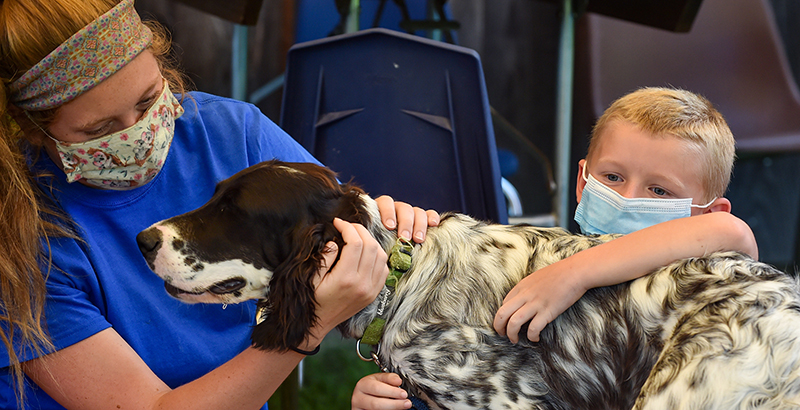In recent times, research on college students’ mental health has shown that they’re worse off than ever before. According to the American College Health Association’s National College Health Assessment in 2022 on student mental health, more than 77% of students have suffered mid to high levels of psychological distress.
In the same period 2022, a survey conducted by HMS, The Healthy Minds Study of 373 campuses in the USA, found that 60% of students are struggling with at least one mental disorder.
In the face of these difficulties, health workers use ESA or emotional support animals (ESA). It’s a therapy that has become increasingly popular for the mental health of students. It provides emotional support and solace to those with anxiety, depression, and other mental health problems.
What is an Emotional Support Animal?
An animal for emotional support can help to mitigate the symptoms of your diseases like depression, stress, or anxiety. These are not trained animals. They can accomplish the same thing by providing unconditional love and companionship.
The Benefits of Emotional Support Animals in Education:
The incorporation of ESAs has its advantages for students and their overall health. They can help students avoid stress and also assist them in living life rather than focusing solely on exams or career tension. The beneficial effects of ESAs on student life include the following:
Stress Reduction
Due to career-making stress, students can forget to enjoy their lives. Destroying childhood because of stress can be guilty at a young age. This stress can be alleviated with the help of emotional support animals. They provide a constant and reassuring presence during stressful times, helping students to overcome stress.
Emotional Stability
Students may face emotional challenges due to succeeding in examinations and overall life. These challenges can make them emotionally weak. However, by interacting with emotional support animals daily students can become more emotionally stable. Emotional stability also enhances focus and concentration, positively influencing academic performance.
Increasing Social Connection
By walking their emotional support animal, students can interact with others. This interaction will enhance their social connection, which can impact their overall life. Moreover, students with ESAs often find themselves in conversations with fellow students or passersby, creating opportunities for social interaction.
Sense of Responsibility
Caring for an emotional support animal creates a sense of responsibility. This responsibility can positively affect time management, organizational skills, and personal development.
Emotional Support in Challenging Times
Many students struggle with challenging times due to study pressure, good marks pressure, or career tension. During challenging times, the presence of an emotional support animal can provide immediate comfort and emotional support to students.
Reduces Loneliness
By living away from their family, students can sometimes feel loneliness. Moreover, loneliness comes with many other mental health problems. With the companionship of an ESA, students can reduce loneliness. They can play with their ESA, spend time with them, and go for a walk.
Challenges Associated With Emotional Support Animals in Educational Institutions:
While emotional support brings positivity to a student’s life, it also brings some challenges as well. Navigating these challenges ensures the well-being of all individuals within the educational community.
Distractions in the Learning Environment
Introducing an ESA into classrooms may pose distractions that can significantly impact the learning experience. Furthermore, the presence of emotional support animals can influence students’ focus and active participation in lectures or discussions.
Educational Distinctions
Different educational settings may have unique considerations. For example, laboratories, studios, or specialized classrooms may have specific restrictions or safety concerns that restrict your emotional support animals.
Allergies and Health Concerns:
Not everyone is ok with the animals, some have allergies too. Educational institutions are crowded areas with thousands of students studying together. Allergies to animals or fear of animals can create discomfort and may require accommodations to maintain a healthy and inclusive environment for everyone.
How Education Institutions Can Accommodate ESA
Address Potential Challenges Promptly:
Institutions must develop a system for addressing concerns or conflicts related to emotional support animals. They must also establish a committee responsible for handling conflicts related to ESAs and finding solutions.
Create a Registration System:
They must establish a registration process for students with emotional support animals to notify the institution of their presence. Education institutions can use this information to coordinate and plan for potential challenges or conflicts.
Establish Clear Policies:
Before allowing ESA on their premises, educational institutions must establish clear policies. It can allow students to follow a fixed procedure and maintain the dignity of their college or schools.
Educating the Community:
There is a need for ongoing education within the community to promote understanding and reduce the stigma surrounding ESAs. Providing information on the purpose and benefits of ESAs can foster a more inclusive environment.
How Students Can Avoid Conflicts And Live Freely With an ESA?
1. Obtain an ESA letter:
You must obtain an emotional support animal letter from a licensed healthcare professional. This letter acts as a legal document for your need for an animal. It also makes you eligible for accommodation.
2. Know and Follow Campus Policies:
Familiarize yourself with the specific policies and procedures regarding ESAs on your campus. Understand eligibility criteria, registration processes, and any restrictions.
3. Communicate with Roommates:
Open and honest communication is crucial. Discuss your ESA with roommates and neighbors well in advance. Address any concerns they may have and establish clear expectations.
4. Respect Allergies and Phobias:
Some of your roommates or friends may have allergies or phobias related to animals. While the companionship of emotional support animals is essential for you, it’s important to respect their allergies. Work towards finding a solution by coordinating with the respective department of your college.
5. Maintain Cleanliness:
You need to maintain hygiene in your college while living with an emotional support animal. It will ensure a healthy and comfortable environment for you and your fellow students. It also helps foster a positive perception of emotional support animals within the community.
Bottomline:
The incorporation of emotional support animals in education goes beyond providing momentary relief. The educational institution must make the proper procedures for ESA, and students also must maintain the dignity of their colleges or schools.



